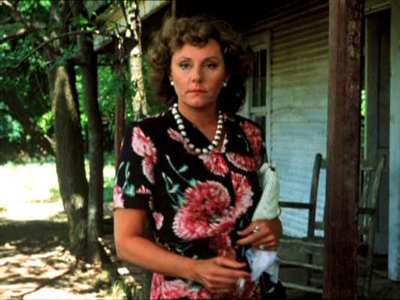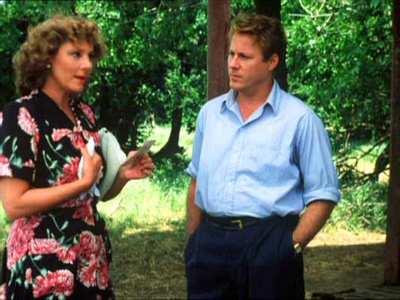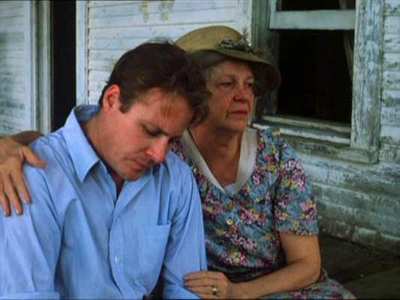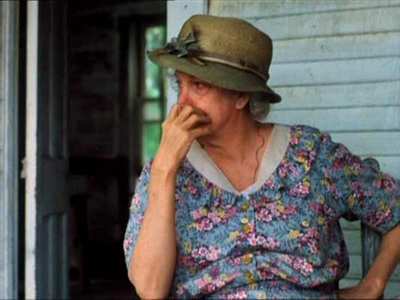Review of Trip to Bountiful, The
Introduction
The Trip To Bountiful started life as a TV play in 1953. Written by Horton Foote (`To Kill A Mockingbird`, `Tender Mercies`), it became more famous as a theatrical play and is recognised as one of the staples in its field. A year does not pass without this play being performed somewhere in the US, and in 1985 a film production was finally commissioned.
Carrie `Mother` Watts (Geraldine Page) lives in Houston with her son Ludie (John Heard) and his overbearing wife Jessie Mae (Carlin Glynn) during the 1940`s. With three people sharing a crowded flat, relationships are a bit strained, particularly between mother and daughter-in-law. After a midnight argument between the two women, Carrie plots her escape back to her hometown of Bountiful. Carrie lives on her memories and sees the town and people clearly, although she hasn`t been back there in over twenty years.
Hiding her pension cheque from her daughter-in-law, Carrie makes her bid for freedom when her daughter-in-law goes out visiting friends and shopping. Carrie has been cooped up in her son`s house for a long time, however, and finds things have changed a lot in the intervening years. At the train station she discovers that trains no longer run to Bountiful and then at the bus station she is only able to get a ticket to the nearby town of Harrison, some 15 miles from her destination.
Successfully evading her son and daughter-in-law at the bus station, Carrie takes the Greyhound Bus and begins her journey home. After a chance chat at the bus station, Carries forges an unlikely friendship with Thelma (Rebecca De Mornay), a newly married young woman. She discovers that Thelma has only been married a year and that her husband has been sent overseas, so Thelma is off to stay with her parent-in-laws until her husband returns. Carrie and Thelma talk for a long time as the bus makes its way to Harrison as Carrie speaks frankly for the first time in a long while about her life and feelings.
Thelma has to leave Carrie to catch her next bus, leaving Carrie alone as events start to catch up with her.

Video
There doesn`t appear to have been an attempt to clean the picture up at all. There is a fair bit of grain in places and in a couple of spots there is definitely some noticeable degradation.

Audio
Based on a play, this is quite heavy on dialogue; all of which is clear.

Features
Return To Bountiful - a 25 minute piece surrounding the origins of the play and it`s subsequent film production. Interviews included with the writer, cast and crew of the film. Quite interesting and educational for someone who isn`t terribly au fait with American theatre.

Conclusion
I`m not really much of a theatre fan, although I`ve managed to see a few films recently that were based on theatrical productions. In the main I`ve enjoyed them, although I wouldn`t have chosen to watch them given the choice beforehand. I`m not sure what it is that has allowed me to enjoy these films more than I anticipated, my usual staple being either thrillers or blockbusters. As theatrical adaptations, they contain strong dialogue, which must appeal to the reader in me, and this film is no exception.
Another thing is that the ensemble cast is quite small, which allows you to focus on the characters and their motivations. The story is quite a gentle one that focuses on our abiding memories of the past and how they don`t always live up to the reality as time marches on forward. Geraldine Page plays the central character in a sympathetic light, although she is a little spoilt at heart too and not averse to minor tantrums if she doesn`t get her way. The choice of actress in a role like this is key and Page does something special here as all the attention is on her `little old lady`. This wouldn`t be enough to hold the attention of most modern film fans, but give it a chance and you`ll find yourself hopelessly getting sucked into the story. Page won an Oscar for her performance here in 1986, beating Meryl Streep`s performance in `Out Of Africa`. Page sadly passed away in 1987 whilst starring on Broadway, which was a fitting end to the life and career of someone who had been acting since the early 50`s and the Oscar in `86 was a fitting and timely tribute.
De Mornay fills up the middle of the film with her unlikely friendship with Page, a chance meeting that blossoms during the road trip through the heart of America. It`s not her most distinctive role by any means, but she provides almost the perfect foil for Page to act off.
John Heard and Carlin Glynn bookend the film as the subdued son and overbearing daughter-in-law, with good solid performances from both. Heard plays a man struggling to find his identity and provide the life he believes his wife and mother would want. Glynn is a woman struggling to assert her authority over her mother-in-law, simultaneously looking for order and respect whilst caring for the obviously frail Page.
It`s a little odd these days to be hearing people treat each other with manners and respect, even if they`re arguing. I guess that`s progessive civilisation for you, but then if you think that then you fall into the trap of the main protagonist here. This is a story that harks back to another age with a central character who harks back to an even earlier age. It`s a strange combination as all good memories tend to be rose-tinted and not so great when you look at the reality. Still, this is a pleasant enough way to spend an hour or so and I feel a little richer for having experienced the performances here.
Your Opinions and Comments
Be the first to post a comment!